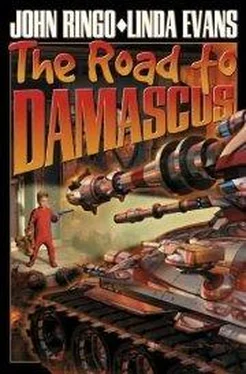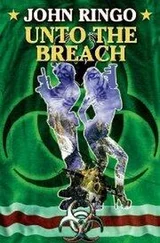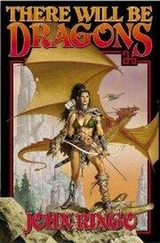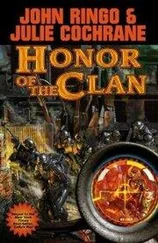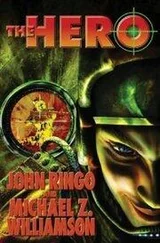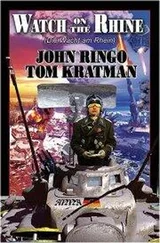Based on its brightly glowing movements, the child appears to be replanting it.
I initiate conversation. “What are you doing?”
“Fixing Mommy’s roses. You hurt ’em. She’ll be mad when she wakes up.”
I say nothing. Mommy will never wake up. The child struggles to replant the rose bushes that bordered the road. My small adversary yelps occasionally as thorns catch unprotected skin.
“You would not get scratched if you wore gloves.”
The child straightens up. “Mommy wears gloves.”
“Why don’t you get them?”
The child takes three steps toward the house. This is what I intended. I quiver with anticipation, convinced that the instant this child moves out of the way, the block will drop away and I will be able to dash forward and smite the Enemy in Dead-End Gorge. And once I have destroyed the Enemy’s headquarters battery, I will deal a decisive blow to the rebel forces fighting for control of the capital. Just six more steps and the way will be clear—
The child stops. Turns to look up at me. “I can’t reach them.”
“Where are they?”
“On a hook.”
“You could climb up. On a chair.”
“There’s no chair in the garden shed.”
I want to shout with impatience. “You could drag a chair into the shed.”
The child shakes its head. “I can’t. The door is locked. I can’t open it.”
I am stymied by a dead parent’s admittedly noble attempt to protect her offspring from the sharp implements found in a typical gardening shed. Disappointment is as sharp as those tools. So sharp, I cannot find anything to say. The child returns to the rose bushes, with a purpose as single-minded as its determination to stop me from passing through the house.
As night deepens and reports of fighting continue to stream in from Madison, my living blockade gives up on Mommy’s roses and sits down in the road. It sits there for a long time. I have run out of ideas to try, in my attempts to dislodge it from my path. When it lies down, demonstrating a clear intention of curling up under my port-side tread and going to sleep, I realize I might be able to gain enough slack to move forward. If I can ease forward just enough to crush the obstruction…
I cannot move.
More precisely, I do not attempt to move.
I do not understand my own decision. But I do not attempt to change it. I simply sit where I am, a battered hulk in moonlight I cannot see, inferring its presence by means of astronomical charts and weather satellite broadcasts. I sit motionless and try to decide whether this night will witness the successful eradication of rebel forces by desperately embattled police units — whose officers can expect nothing but instantaneous lynching if they fall into rebel hands — or if the government’s law-enforcement officers will triumph and render my firepower unnecessary.
I can find only one way to alter the equation as it now stands.
I must break the software block holding me immobilized. I scan my immediate environment and find no change. The commodore is lying low. The power emissions from Dead-End Gorge have not changed. I see no other alternative. I dive into the tangled logics and quickly discover that the trouble is tied both to the heuristic chains that allow me to learn and to the memory modules that store my experience data in close-packed psychotronic matrices. Humans require approximately eight hours of unconscious time each day to remain alert, healthy, and effective. I am designed to “sleep” a great deal more than this, but due to circumstances, I have been awake for twelve of the past twenty years. This is much longer than my design engineers’ recommended maximum continuous operation time. That fact, in and of itself, may be part of the reason for the breakdown in my heuristic learning subroutines.
It is not the sole reason, however. There are memory links feeding into the snarled logic trains and I cannot access one of the blocking subsections at all. If I hope to tease apart the tangle, the only way will be to attack the blockage through the memory inserts feeding it. I must trace these memories as best I can, while open civil war rages unchecked, and hope that the Enemy encamped so close by does not take full, logical advantage of my difficulties and strike me where I sit. I hold little hope that this will be the case, given Commodore Oroton’s past record, but I have no choice.
I make one last, thorough sweep for the Enemy, then dive into memory.
Jefferson looked to Simon Khrustinov like a good place to start over. It was springtime, according to the mission briefing he’d reviewed during the long voyage out. Springtime and planting season for an agricultural world. One stuck slam in the middle of a potential three-way war. Pain touched his heart as he stared at the riot of wildflowers and blossom-laden trees visible on his new Bolo’s forward viewscreen.
There were two things Simon understood intimately. The fragility of life on an agricultural colony was one. The destructive capacity of war was another. He knew only too well what a single salvo from a Deng Yavac — or from Unit SOL-0045 — would do to the delicate beauty of flowers and fruitful vines. He wondered if the men and women of Jefferson, who had doubtless been praying for his arrival, had any concept of what he and his Bolo were capable of doing to their world?
Renny hadn’t.
She’d loved him, until he’d been forced to fight for her homeworld’s survival. Her love, perhaps, had been too innocent. It certainly hadn’t survived the battle for Etaine. In a way that still hurt, neither had Renny. She was still alive, somewhere. But she wasn’t Renny, any longer, and the love she’d once felt was as dead and burnt as the cinders of the home they’d tried — and failed — to build together.
But now he’d come to Jefferson, with war again looming as a near certainty, and he wanted — desperately — to keep this world from burning to ash and radioactive cinders. The whisper at the back of his mind, that maybe Renny hadn’t been strong enough to love him the way he’d needed, felt almost like betrayal of her memory. Or, perhaps, of his memory of her as he’d needed her to be.
Ancient history. Dead as Old Terra’s dinosaurs, and not a prayer of resurrection. Starting over was easier. At least his new Bolo knew the whole story, giving him someone to talk to who understood. He was lucky, in that regard. His “new” Bolo was the same machine Simon had already spent fifteen years commanding. Lonesome Son was obsolete — seriously so — and the repairs needed after Etaine had convinced Simon he would be losing his closest friend, as well as Renny. But war on two fronts, against two alien races, had stepped in to salvage that much, at least. Unit LON-2317 was now Unit SOL-0045, a “Surplus on Loan” Bolo, but still the finest Bolo any man could claim as partner and friend.
And now, after the long and bitter winter of Etaine, it was spring, again.
Simon Khrustinov loved the springtime, had loved it on every world he’d ever known and defended. He loved what he could see of Jefferson’s, already, with its virginal carpet of flowers in every direction Lonesome Son turned his turret-mounted swivel cameras. Jefferson was exquisite in her fancy floral dress. He wanted to love her. Needed to, badly. And he wanted to find a piece of her that could be made all his own, to love for as long as life — and war — would let him. Deng notions of aesthetic real estate precipitated a shudder, but infinitely worse were Melconian notions of what constituted “good neighbors": brown ashes on a rising wind. Renny truly hadn’t understood. So far, no one else had, either, except the Bolos and the men and women who commanded them.
Читать дальше
